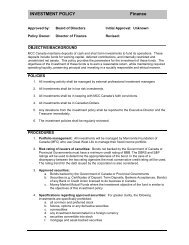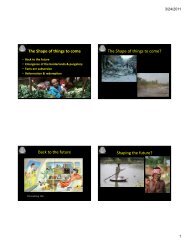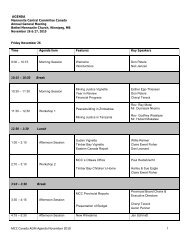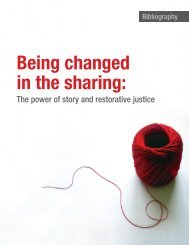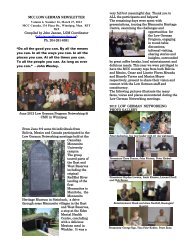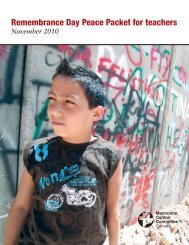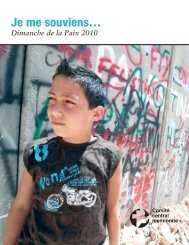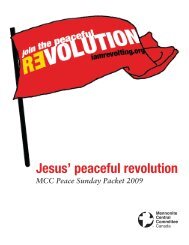Walking together: Healing and hope for Colombian refugees
Walking together: Healing and hope for Colombian refugees
Walking together: Healing and hope for Colombian refugees
Create successful ePaper yourself
Turn your PDF publications into a flip-book with our unique Google optimized e-Paper software.
72<br />
w a l k i n g<br />
t o g e t h e r<br />
significant stress to the family. When inviting the refugee family to tell their story to a larger group it could be<br />
a good idea to offer alternatives such as another time or a different setting. That way the family will have a<br />
com<strong>for</strong>table “out” if they are not ready to share their story in the setting you propose. When they are ready<br />
to share their story, make sure you give them enough time - 15 minutes probably won’t be enough.<br />
While the telling of their story holds many benefits <strong>for</strong> the listener, including elements of awareness<br />
raising <strong>and</strong> advocacy, remember that the main reason, at least at first, is that of healing <strong>for</strong> the refugee<br />
family. Always let the family know that their com<strong>for</strong>t <strong>and</strong> their sense of well-being is what is most<br />
important to you.<br />
When opportunities arise to talk with the refugee family about their past <strong>and</strong> the traumatic experiences<br />
they survived, it may be helpful to remind yourself of some of the following pointers: 22<br />
Be<strong>for</strong>e the Conversation: To prepare yourself <strong>for</strong> conversations with the refugee family about difficult<br />
experiences from their past, it will be useful <strong>for</strong> you to learn as much as you can about their country <strong>and</strong><br />
culture. The more you are aware of the history <strong>and</strong> context of their country as well as important elements<br />
of their culture <strong>and</strong> even the process of acculturation during resettlement, the more you will be able to<br />
underst<strong>and</strong> the refugee’s experiences. Use different sources to learn as much as you can - a good place<br />
to begin could be this resource material <strong>and</strong> the websites listed in the resource sections, but don’t <strong>for</strong>get<br />
the best resource - the refugee family itself. Conversations about the good things from home - culture,<br />
traditions, the importance of family, faith, community - will be welcomed <strong>and</strong> are an important balance<br />
to conversations about the difficulties they endured.<br />
“We had a meeting with the church, we sat<br />
in a circle. They made us remember our past,<br />
why we left Colombia. For me it was very<br />
difficult to speak about it. I am so happy here,<br />
I want to <strong>for</strong>get everything. It was really hard<br />
<strong>for</strong> me. When I got home afterwards I felt like<br />
my head exploded I had such a bad headache.<br />
But it is good to talk. It was very good because<br />
the church wanted to get to know us more,<br />
know more about our story. The people who<br />
listened to my story are really supportive to us<br />
<strong>and</strong> are very affectionate to my children.”<br />
- Adriana<br />
Be<strong>for</strong>e entering into conversations about trauma,<br />
be sure that you spend time learning about<br />
who the <strong>refugees</strong> were be<strong>for</strong>e their problems<br />
began. Learning about their lives, their roles<br />
in their communities, their occupations, what<br />
they loved to do <strong>and</strong> what was important to<br />
them is valuable <strong>for</strong> several reasons: this allows<br />
the <strong>refugees</strong> to reflect <strong>and</strong> reconnect with their<br />
past, recognizing <strong>and</strong> valuing where they have<br />
come from <strong>and</strong> who they are, as well as letting<br />
you know more about them as people - not<br />
just <strong>refugees</strong>. These kinds of conversations help<br />
build trust <strong>and</strong> <strong>for</strong>ge lasting relationships, <strong>and</strong><br />
they lay the groundwork <strong>for</strong> later conversations<br />
about traumatic experiences.<br />
22. Adapted from New Neighbours Hidden Scars, chapter 3 <strong>Healing</strong> the Hurt, by Evelyn C. Lennon, MSA, MA. (2005) Minneapolis,<br />
MN: The Centre <strong>for</strong> Victims of Torture, www.ctv.org,



